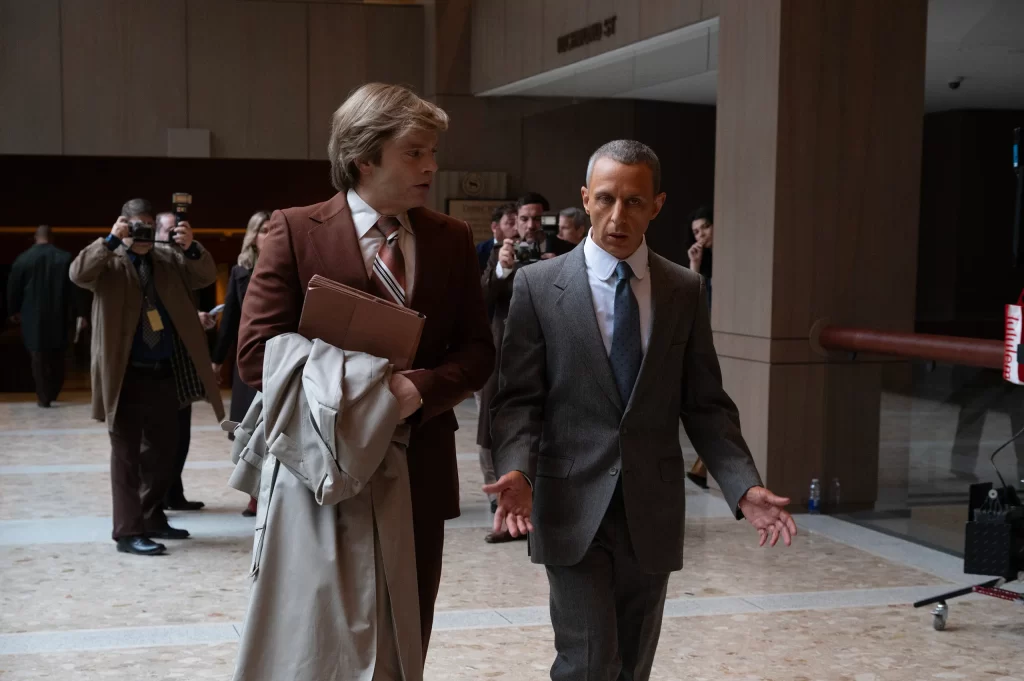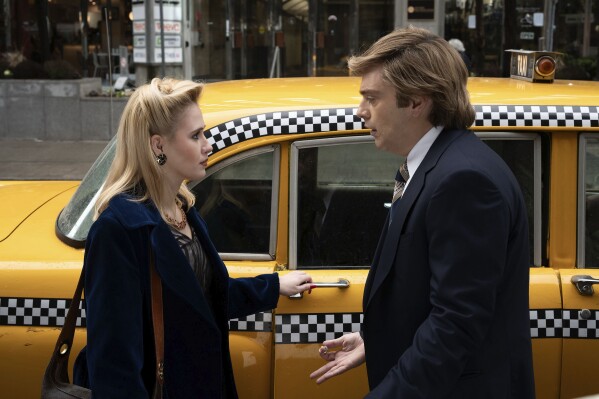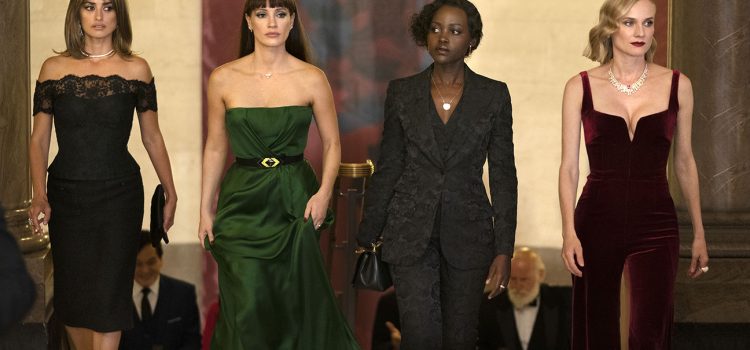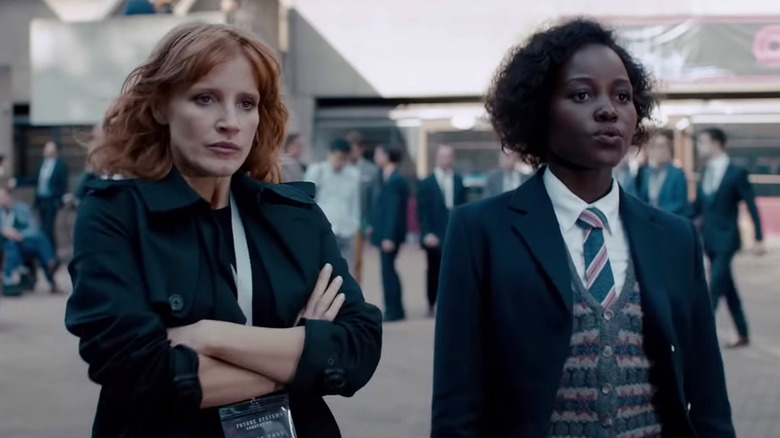By Lynn Venhaus
Neither a hatchet job nor a puff piece, “The Apprentice” is another familiar take on the American Dream that leads to great wealth, meteoric success, and moral quagmires.
More than anything, this origin story is a study of power – how people get it, what they do with it, how they try to hold on to it, and how it can be lost. Director Ali Abbasi looks inside power structures and systemic corruptible institutions, and he shows how family influences our formation.
Featuring two iconic 20th century figures, the film only hints at a political future, but all the furor pre-release is a sad commentary on our divisive partisan landscape.
The time period is only focused on the 1970s and 1980s, starting out in 1973 New York City, when Manhattan was scuzzy and Queens was rougher, a rotting Big Apple that was desperate for a makeover.
Determined to emerge from his powerful father’s shadow and make a name for himself in Manhattan real estate, aspiring mogul Donald J. Trump (Sebastian Stan) is in the earliest days of his career when he encounters the man who will become a game-changer for him — political fixer Roy Cohn (Jeremy Strong).
Seeing promise in the young buck, the influential attorney teaches his new acolyte how to amass wealth and power through deception, intimidation, and media manipulation. And the rest, as they say, is history.

Stan effectively portrays an eager-to-please social climber who is in awe of how ruthless and flamboyant Cohn is. Their mentor-pupil relationship is the flip side of Mr. Miyagi and Daniel in “The Karate Kid.”
Their alliance is portrayed with great gusto by Stan, who easily slips into the skin of the future 45th U.S. president during his hedonistic days as a swinging bachelor, first with little of the bluster he’d later develop, and then subtly transforms into a mover and a shaker who enjoys status and celebrity — and sucking up all the oxygen in the room.
Emmy and Tony Awards-winning Jeremy Strong is chilling as the amoral ultimate power broker. Cohn eventually becomes a tragic figure as he succumbs to AIDS. To see Strong maneuver through the upper echelon of NYC society and see how he manipulates people for his own gain is as fascinating as watching a magician’s tricks.
Cohn’s three cardinal rules: “Admit nothing, deny everything. Attack, attack, attack. You claim victory and never admit defeat” are reinforced in boardrooms, courtrooms and private dining rooms.
They become Trump’s playbook as he transforms from notorious real estate magnate Fred Trump’s ambitious son to confident major player in the elite Manhattan circles that he desperately wanted to be part of, craving the spotlight.
The demanding Fred Trump Sr., played with cunning by Martin Donovan, has little patience for his second-born son’s exploits, and even less tolerance for his oldest son Fred Jr.’s decision to be a TWA airline pilot and not join the family business. He disdained any sign of weakness.

The screenplay by Gabriel Sherman, a veteran journalist who has chronicled Trump for Vanity Fair, focused on how Cohn schooled his protégé, only to have his greatest admirer turn his back on him years later at his most vulnerable. He’s specific about the psychology behind the butterfly emerging from the cocoon.
Sherman, who wrote the fact-based script in 2017, has dramatized events that are considered historical records. It is not propaganda from any side and is familiar enough to those who follow the news so that it really doesn’t offer anything new other than a character study with shades of the Corleone family saga peeking through at times.
Abbasi presents an interesting climb to the top scenario and zeroes in on influences that shaped this polarizing figure in a realistic way. It’s not flattering, but rather an attempt to understand how someone is molded into their public persona.
By capitalizing on the ’70s and ’80s excesses, the glitz and glamour is recognizable in Aleksandra Marinkovich’s meticulous — and sometimes gaudy — production design and Laura Montgomery’s colorful vintage costume design. Lensed by Kasper Tuxen, the film presents that signature bright-lights, big-city landscape where both Cohn and Trump flourished, and the soundtrack’s throbbing beats are reminiscent of the hip dance club scene.
People who already have their minds made up about the film may have issues with the point of view, and those who enjoy delving into psychology will find much to debate, especially in the more disturbing revelations.
While the film’s potency is in the two primary actors’ fearless performances, the supporting cast excels at not being caricatures. Just as Donovan nails papa Fred, Maria Bakalova doesn’t hit a false note as Ivana, Donald’s first wife and mother to three of his children, whom he tires of after she demonstrates a spidey sense for business.

Catherine McNally is a supportive mom as Mary Anne Trump, and Charlie Carrick is sympathetic as the troubled alcoholic Freddy Trump Jr. Famous figures include Ian D. Clark, who looks and sounds like former NYC Mayor Ed Koch, Mark Rendall as politically savvy advisor Roger Stone, and Bruce Beaton has one memorable scene as Andy Warhol at a party.
The film may have an uphill climb because of all the controversy surrounding it, but “”The Apprentice” succeeds in giving us a layered portrait of a man always in the news who everyone has an opinion about, one way or the other.
“The Apprentice” is a 2024 dramatic historical biography directed by Ali Abbasi and starring Sebastian Stan, Jeremy Strong, Maria Bakalova, Martin Donovan, Charlie Carrick, Catherine McNally, Ian D. Clark, Mark Rendall and Bruce Beaton. It is rated R for sexual content, some graphic nudity, language, sexual assault, and drug use and the run time is 2 hours. It opened Oct. 11 in St. Louis. Lynn’s Grade: B.


Lynn (Zipfel) Venhaus has had a continuous byline in St. Louis metro region publications since 1978. She writes features and news for Belleville News-Democrat and contributes to St. Louis magazine and other publications.
She is a Rotten Tomatoes-approved film critic, currently reviews films for Webster-Kirkwood Times and KTRS Radio, covers entertainment for PopLifeSTL.com and co-hosts podcast PopLifeSTL.com…Presents.
She is a member of Critics Choice Association, where she serves on the women’s and marketing committees; Alliance of Women Film Journalists; and on the board of the St. Louis Film Critics Association. She is a founding and board member of the St. Louis Theater Circle.
She is retired from teaching journalism/media as an adjunct college instructor.







